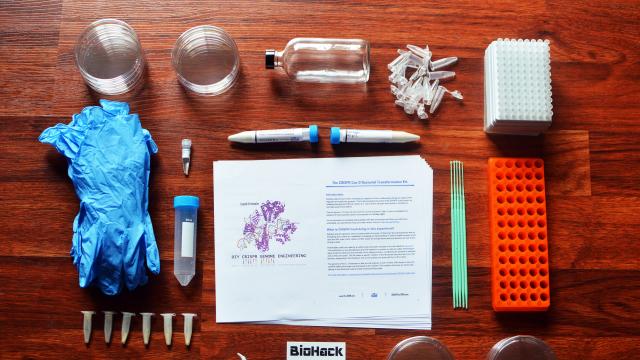Last week, the Food and Drug Administration issued a stern warning to biohackers in America: Undertaking DIY gene therapy, it warned, is risky and selling the supplies to do it is flat-out against the law.
The ingredients for CRISPRing a human, sold by The Odin. Image Courtesy Josiah Zayner
“FDA is aware that gene therapy products intended for self-administration and ‘do it yourself’ kits to produce gene therapies for self-administration are being made available to the public. The sale of these products is against the law. FDA is concerned about the safety risks involved,” the agency said.
The statement came on the heels of two very public demonstrations of unregulated, do-it-yourself genetic engineering. In one, a 27-year-old software engineer injected himself with an unproven gene therapy for HIV while streaming live on Facebook.
In the other, a well-known biohacker injected himself with a gene to promote muscle growth at a San Francisco biotech conference. New genetic engineering technologies has spurred a burgeoning movement of biohackers doing sophisticated science outside of formal labs.
Until last week, though, regulators have mostly stayed out of it.
The FDA’s brief statement raised many questions. For one, the agency singled out CRISPR in particular as a subject of concern, noting that it “considers any use of CRISPR/Cas9 gene editing in humans to be gene therapy.” But what about other gene editing techniques, of which there are many? It also offered no details on which regulations selling DIY gene therapy supplies violated, or how it planned to enforce those regulations.
After the initial warning, Gizmodo reached out to the FDA for clarity on how it might affect the biohacking community.
For one, the agency, made clear, it’s not just CRISPR: “Gene editing in humans by any method would be considered gene therapy regulated by FDA,” a spokesperson said, noting that it only mentioned CRISPR because it’s such a buzzy word.
And the selling of kits, it seems, would be considered illegal because, in broad terms, the agency would consider it the sale of any unapproved “gene therapy product” akin to the sale of an unapproved drug. If someone wants to test an unapproved drug in humans, they must first clear a clinical investigation with the FDA.
Per the agency:
A clinical investigation, described in title 21 of the Code of Federal Regulations, part 312.2 is defined as: any experiment in which a drug is administered or dispensed to, or used involving, one or more human subjects. An experiment is any use of a drug except for the use of a marketed drug in the course of medical practice.
The clarification makes it appear likely that the warning was motivated by the October experiment involving the unproven gene therapy for HIV. While the subject of the experiment actually injected the vaccine himself, its development was paid for by a company, Ascendence Biomedical. The company plans to sell the “research compounds” used to make the vaccine online and to fund “transparent” clinical trials that would skirt typical regulatory oversight by having people deliver their own treatment.
The initial experiment raised significant concerns because there has been no human clinical trials of such an HIV treatment to date.
Ascendence Biomedical says it has no plans to change course based on the warning.
“It sounds like the FDA would like to believe that a research compound expressly not for human consumption becomes a clinical investigation as soon as the individual in receipt of it decides of their own free will to use it for personal research purposes,” CEO Aaron Traywick told Gizmodo. “These definitions were not set in place to regulate such activities, and there appears no specific law regulating such activities.”
If the FDA chose to step in, it could also affect The Odin, a company run by Josiah Zayner, the biohacker who injected himself with CRISPR. The Odin sells kits for home genetic engineering, and though those kits do not expressly mention humans, it also sells a human DNA plasmid that promotes muscle growth for $US20 ($26). (It comes with this warning: “This product is not injectable or meant for direct human use. The DNA needs to replicated and purified before use in human cells.”)
Zayner also says he has no plans to heed the agency’s warning, because he feels it does no apply.
“It seems people are getting after me because I promote people doing something even though I am not selling them the thing,” Zayner told Gizmodo. “Even if someone were to inject the DNA, the concentration is so low and it doesn’t have the required chemicals to get it in cells efficiently.”
The FDA would not offer further detail on which products it specifically considers in violation of its regulations, or how it might penalise those that violate them.
“I can’t cite specifics,” a spokesperson told Gizmodo, “Information about the agency’s inspection and surveillance activities, including whether the agency is considering action, is generally not made available to the public unless and until enforcement action is taken.”
In the past, with a few exceptions, the regulators have largely left biohackers alone. The FBI has even gone so far as to cultivate a friendly relationship with them. At least as far as the FDA is concerned though, that laissez faire attitude may be a thing of the past.
